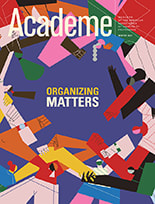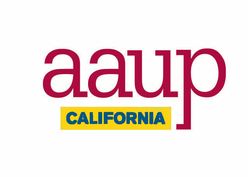Delegates to the Biennial Association Meeting also voted for one at-large and five regional members of the AAUP's governing Council. See the council members here.
|
Delegates to the Biennial Association Meeting also voted for one at-large and five regional members of the AAUP's governing Council. See the council members here.
0 Comments
This year the AAUP was pleased to offer this excellent new content presented at this year's SUMMER INSTITUTE JULY 21-24 in Reno, Nevada..
On March 7, AAUP reached out to our members about a proposed affiliation with the American Federation of Teachers.
There are three components to AFT member benefits programs: 1) Individual member benefits including discount programs, life insurance, and car rentals; 2) benefits that help local chapters by providing coverages and services that are more expensive to source at the local level; and 3) benefits that chapters can purchase for members as part of their dues process. As a reminder, a delegate vote on a proposed affiliation with the AFT will take place at the AAUP Biennial Meeting in June. Affiliation documents and more information (including more information on AFT benefits for members and chapters) can be accessed on the AAUP website here (member login required). The 2022 AAUP Summer Institute is coming to Reno, Nevada! We’re excited to announce that the University of Nevada, Reno, is the site of this year’s program, to be held July 21–24.
In two years, the world of higher education has changed radically, with new COVID-safety concerns, more austerity budgets targeting faculty and staff, and rising governance and academic freedom violations. That’s why Summer Institute is needed more than ever. Faculty, students, and academic workers all over the country are rising up and taking a stand on their campuses to advocate for the standards and resources our students and communities need to thrive. Join more than two hundred other higher education professionals for four days of exciting workshops and special sessions. Featuring presenters experienced in policy, strategy, organizing, and leadership, the training at this year’s Summer Institute will give faculty members the skills and tools to build a powerful voice on campus and to:
View the complete program and reserve your spot now for the 2022 Summer Institute, July 21–24 in Reno, Nevada! Today we are sharing an update on an important initiative that began last August, at the direction of the AAUP’s national governing Council. In September 2021, we announced that the AAUP and the American Federation of Teachers were exploring ways to expand and enhance our very successful ten-plus-year organizing partnership. We are incredibly proud of the work that AAUP and AFT have done together to organize faculty and graduate employees around the US and to strengthen higher education and the profession. As a result of our partnership, more than twenty thousand faculty and other academic workers are in unions that are jointly represented by the AAUP and the AFT. In addition, we have worked together on important legislative efforts at the federal and state level to expand access to higher education, ensure adequate funding for public institutions, increase Pell grants, and expand academic workers’ right to unionize. AAUP members are already being included in planned student loan debt clinics run by AFT higher ed staff, and AFT members have had the opportunity to attend our Summer Institutes. Since last fall, we’ve been discussing how to best build on our successful organizing work, support our shared commitment to education and the common good, and build a stronger and more inclusive higher education movement. Our update today is to share with you that a tentative agreement on an affiliation with the AFT has been reached, and that the AAUP’s governing Council has unanimously recommended that a vote to ratify the affiliation be brought to the AAUP’s biennial meeting in June. The tentative agreement is the result of months of work by the AAUP and AFT’s teams, thorough consultation with the AAUP’s Council, and careful review by our legal experts and auditors. It also reflects the four core principles that the Council laid out at the beginning of this process: ● Preserve the AAUP’s independence and autonomy ● Increase the AAUP’s reach and influence among the profession ● Maintain the AAUP’s brand in higher education ● Be fair to the AAUP staff Under the terms of this affiliation agreement, all AAUP members, by virtue of their membership in the AAUP, will also be members of the AFT/AFL-CIO. All AAUP collective bargaining chapters will become chartered locals of the AFT and all AAUP advocacy members will be part of a nationwide AAUP-AFT local. All CB and advocacy chapters will also continue to be chartered chapters of the AAUP. AAUP members and AAUP chapters will have access to AFT support and services, including specific AFT member benefits. AFT higher ed members will have access to certain services and programs that the AAUP provides as a service to the profession. Current “solo” AFT higher ed members will not become members of AAUP as a result of this affiliation. All new academic organizing—in both CB and non-CB settings—will be joint AAUP-AFT efforts and all new members will enjoy the rights and benefits of, and have access to the services and support of, both national organizations. This affiliation will not result in an increase in national AAUP dues and, for current AAUP members, AFT per capita will be covered as part of the AAUP dues. Where applicable, AAUP solo CB chapters will become members of the AFT state federation at a reduced per capita rate. AAUP solo CB chapters will also become members of their state AFL and central labor councils (CLCs). While solo AAUP CB chapters will be required to pay per capita to the AFT state federations, the state AFL and the local CLC, we believe these costs will be financially manageable for most solo AAUP CB chapters. (For more information, click here and log in with your AAUP member credentials.) In order to provide support and assistance to our solo CB chapters as they make this transition, the AAUP has set up a CB chapter assistance fund. The national AAUP and its chapters will remain autonomous organizations with full control over their own finances, policies, programs, and staff. The national AAUP will continue to be governed by the AAUP Council; will continue to have its own committees; and will have complete autonomy over the Redbook, our policies and statements on behalf of the profession, investigations, censure, and sanction. The AAUP will continue to employ its own staff and will retain sole authority over management of its budget and programs. While the affiliation with AFT is not cost-free to the AAUP, we do believe that the financial impact on our organization is manageable. An overview of the agreement, a frequently asked questions document, and the agreement itself can be found here (member login required). The relationship between the national AAUP and its chapters will not be changed. The AAUP will continue to operate as an autonomous entity and will continue to provide the same services and support to our chapters, our members, and the profession. This affiliation recognizes and builds upon our successful joint organizing agreement and will allow the AAUP to maintain our organizational independence and our reputation in the profession while expanding our influence and reach in higher education. It preserves and memorializes our two organizations’ strong commitment to working together and recognizes that important and distinct role that the AAUP plays in the academy. Crucially, this affiliation recognizes that there is much more we can do together to confront the challenges facing higher education and our nation. It establishes a structure on which we can build a stronger, more inclusive higher education movement. It provides a pathway for our chapters to work more closely in solidarity with their AFT colleagues around the country and in their states and communities. It also allows us to enhance our successful joint organizing work and to expand into sectors of the academy where we have not yet had the opportunity to organize together. We know that the AAUP’s knowledge and expertise paired with the AFT’s reach and resources have been a winning combination at the University of Oregon, Oregon State University, the University of New Mexico, the University of Alaska, the University of Illinois-Chicago, and the University of Vermont, to name a few. We believe that there is much more that we can do together to organize the unorganized in union and non-union settings. The three of us, along with the Council of the AAUP, believe that this is a truly historicmoment for the profession. It is a truly historic moment for free inquiry in a free society, a truly historic moment for the common good, and a truly historic moment for democracy. We don’t believe it’s an exaggeration to say that democracy is hanging on by a thread right now, and a strong higher education movement is part of what’s needed to salvage and strengthen our democracy. In the few months since we started exploring possibilities for affiliation, the attacks on higher education and the common good have increased. Educational gag order legislation aimed at curtailing academic freedom has been introduced in thirty-eight states. We see administrations acquiescing to pressure from governing boards and state legislatures on fundamental issues such as academic freedom, faculty shared governance, and due process. We see state systems launching full assaults on tenure. At the same time, we see a renewed interest in organizing to confront these challenges among faculty and other academic workers. On campuses where unionization is possible, we see faculty forming organizing committees and starting union campaigns. We also see a renewed interest in building and strengthening advocacy chapters as a vehicle for campus change. The ongoing challenges facing higher education and this renewed interest in organizing underscore the need for solidarity—with our colleagues and within our own organization, to be sure, but also with other organizations and with the academic labor movement as a whole. This affiliation will help all of us—AAUP and AFT Higher Education members together—achieve this. The full text of the agreement, along with a summary, can be found here (member log in required) If you are unable to access this material, please email [email protected], and we will provide the information in an alternate form. We will be sending a formal notice about the affiliation vote to take place at the June 2022 biennial meeting later this week. Please note that we will also hold a question-and-answer session on Thursday afternoon, June 17, at the AAUP Conference and Biennial Meeting. Over the next few weeks, we will be reaching out to chapters and leaders to discuss this proposed affiliation further and to answer any questions they may have. In the meantime, please do not hesitate to reach out to the three of us if you have any questions. Sincerely, Irene Mulvey, President Paul Davis, Vice President Chris Sinclair, Secretary-Treasurer Opposition to educational gag orders (EGOs) is ramping up. We’d love for you to join us in this work.
A wave of states has introduced broadly similar legislation that would restrict K–12 teachers and college faculty across disciplines from talking about “divisive topics” and teaching about the role of racism in US history and society. These educational gag order bills have the potential to chill the free exchange of ideas at universities and colleges and to violate core AAUP principles. For a list of all the active bills we’re tracking, visit our Educational Gag Orders dashboard. There’s also the EGO resource page where you can access our draft op-ed, model legislative resolution, and other resources. Please join the AAUP today to help with this fight against efforts to suppress the rights of faculty. Join the AAUP today! As a member of the AAUP, you’re joining with tens of thousands of others to protect higher education as a common good. Join today.  Winter 2022 | Vol. 108, No. 1 The winter issue of Academe explores how the pandemic has changed faculty organizing and engendered new kinds of solidarity. The articles offer snapshots of the recent work of AAUP chapters around the country, provide templates for expanding the faculty’s influence on campus, and draw out lessons that chapters can carry forward into a postpandemic era. They also serve as a reminder that, despite the upheaval of the past two years, the power of AAUP chapters is still built on the same foundations of effective organizing.  Dear Colleagues, As a union family, as colleagues, we are unified in our resolve for a contract for all of us and in breaking down the barriers of systemic injustices. We are excited to announce that after two years of bargaining through a pandemic – we have a new contract! Our members overwhelmingly voted in favor to ratify the Tentative Agreement with the CSU; 95% of members who voted said yes. In addition, we had our highest voter turnout of the past decade. As your colleagues and member-leaders of our CFA union family, we want to thank each and every one of you for turning out and showing the CSU administration that this contract matters. This new contract and our vote show that we can win pay raises and address issues of anti-racism and social justice at the same time. Our salary increases – General Salary Increases (GSI), Service Salary Increases (SSI), and Post Promotion Increases (PPI) – mean so much more to our members, addressing need with immediate increases, as well as a $3,500 COVID Service Award, which acknowledges the tremendous amount of uncompensated labor heaped onto faculty during the early phase of the pandemic. And we will reopen salary negotiations next year to further address salary equity and inflation. The anti-racism and social justice provisions in our new contract are powerful. We took a number of steps to accomplish this, including increasing exceptional service awards and naming “cultural taxation” as a workload problem faced by faculty whose social identities include women and/or Black, Indigenous, and people of color (BIPOC), and/or LGBTQIA+. Lecturers deserve the increased rights and respect gained in this contract, including expanded range elevation. We secured three years of expanded eligibility to many more lecturer and librarian faculty who were shut out of the program in the past. Counselor and librarian working conditions will improve with this contract through new terms for teleworking. Our faculty knew it was time to modernize and allow these important services to happen on and off campus locations, and we’ve seen it work for the last two years. Coaches now have more stable job security with the opportunity for multi-year contracts, instead of being on year-to-year contracts for decades. This truly is a contract for us all. And these provisions will make a difference collectively and individually. Charles Toombs; CFA President; Professor, Africana Studies, San Diego State “After two hard-fought, member-driven years of bargaining, we have a new contract! This vote signifies that we can bargain for salary gains while at the same time moving our working conditions forward through an anti-racism and social justice lens. We are stronger together and our votes demonstrate that emphatically. This is a historic contract for all of us.” Kevin Wehr; CFA Vice President; Professor, Sociology, Sacramento State “This is a historic contract in so many ways; it is the first contract bargained explicitly with our anti-racism and social justice frame, and we’ve made some great strides on this including new and defensible rights; there are gains made in important areas of the contract that all members will benefit from, including several firsts for CSU faculty and firsts for the nation; we have a fair compensation package that demonstrates equal pay for equal work; and all of this was bargained during a pandemic—another first that hopefully will not be repeated!" Vang Vang; CFA Treasurer; Librarian, Fresno State “When I joined the CFA Bargaining Team, my goal was to win a contract that I could be proud of, a contract that would have something for every member. Raises are awesome but we achieved so much more in this contract, and I could not be prouder. For my work, changes to Article 20 will make an immediate difference, giving librarians and counselors the right to telework. This shows us respect as professionals. I cannot thank my librarian colleagues across the 23 campuses enough for advocating alongside myself and our bargaining team for this win. For me, this contract is just the beginning.” Even with this contract, our advocacy continues. We still have a salary reopener next year. Our workgroups need to meet about much needed measures like parental support and teaching tenure/professor of practice. Additionally, we look forward to the Chancellor’s upcoming announcement regarding alternatives to policing and working with him on a path forward. We need all of us, together, statewide and on our chapter campuses to continue our important advocacy to further our collective rights, respect, and justice. Please continue to be in contact with your chapter leadership and chapter representatives for our work to progress forward. Again, as your colleagues and CFA member-leaders, we thank each and every one of you. Together, we secured a contract for us all. In union, CFA officers State legislatures across the nation have passed legislation barring the teaching of “divisive concepts.” In some states, this legislation excludes teaching about race and gender at the university level. Faculty senates at Michigan State, Portland State, DePaul University, Molloy College, and the Universities of Alabama, Colorado, Delaware, Minnesota, and Oregon have all passed resolutions defending academic freedom and rejecting such educational gag orders.
We’re pleased to offer a webinar on faculty senate resolutions on behalf of our coalition partners at the African American Policy Forum. Please join in a discussion on Thursday, February 17, at 1 p.m. ET, about the importance of these resolutions to the preservation of education and why institutions of higher education need to commit to ideologically free classrooms. Two members of the African American Policy Forum, DePaul University professor Valerie Johnson and Portland State professor Jennifer Ruth (who also serves on the AAUP's Committee A), will lead the webinar and answer questions about how to use shared governance to fight back against this assault on academic freedom. Resources to pursue the resolution campaign on your campus will be provided. Register at https://www.aaup.org/event/webinar-using-faculty-senate-fight-educational-gag-orders. Best wishes, Gwendolyn Bradley, AAUP Senior Program Officer |
Archives
May 2023
Categories
All
|




 RSS Feed
RSS Feed